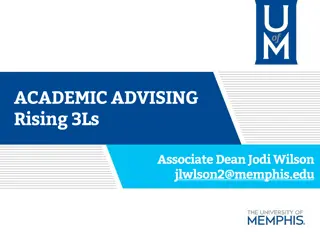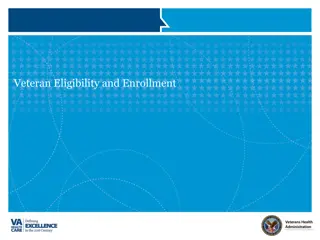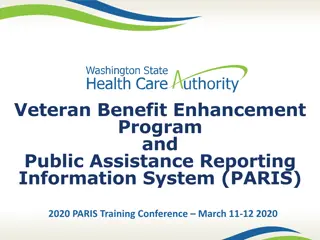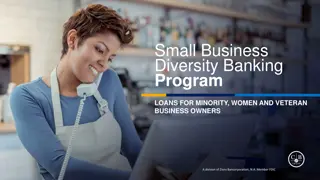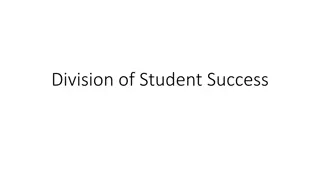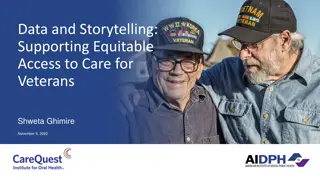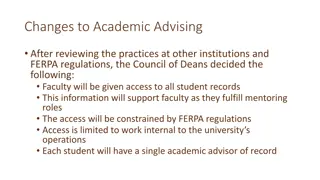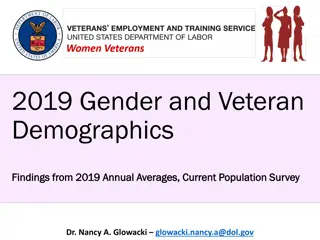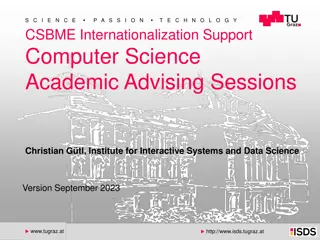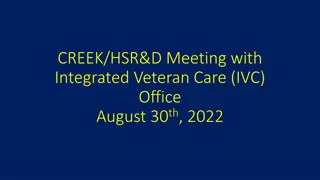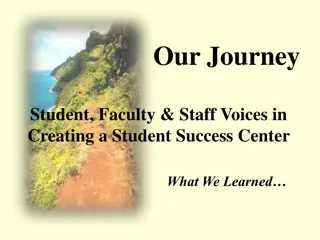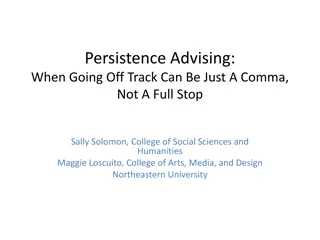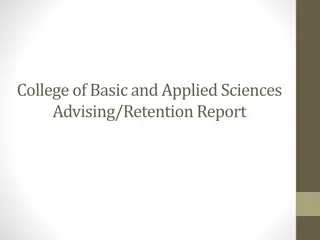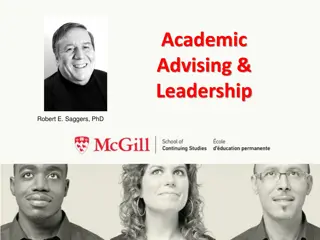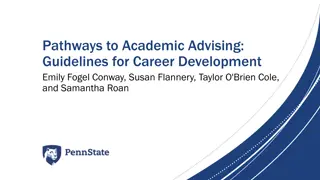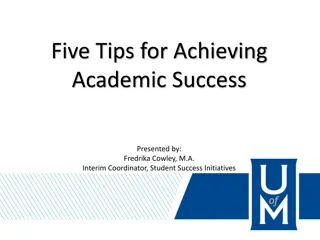Enhancing Student Veteran Success Through Academic Advising
This presentation focuses on the critical role of academic advising in supporting student veterans' transition and success in higher education. Topics include best practices, advising theories, overcoming stereotypes, and personal experiences of veteran presenters. Attendees will gain insights into the impact advisors have on student veterans' overall success and learn strategies to better support this student population.
Download Presentation

Please find below an Image/Link to download the presentation.
The content on the website is provided AS IS for your information and personal use only. It may not be sold, licensed, or shared on other websites without obtaining consent from the author. Download presentation by click this link. If you encounter any issues during the download, it is possible that the publisher has removed the file from their server.
E N D
Presentation Transcript
Advising as a Critical Component of Student Veteran Success Crisann Hanes, M.Ed. & Bob Heckrote, M.Ed. February 24, 2021 | Virtual #SMCS21 @NASPAtweets
Agenda Desired learning outcomes Presenter introductions Audience poll Basic Academic Advising Theories Audience Poll Academic Advising Stereotypes & Other Issues Our 5 Advising Principles Q&A session #SMCS21 @NASPAtweets
Learning Outcomes Increased understanding of the impact academic advisors have on student veteran transition Identify & discuss current best practices in advising student veterans Recognize different advising theories and their application to military-connected students Increased understanding of the impact academic advisors have on overall student veteran success #SMCS21 @NASPAtweets
Meet Your Presenters Bob Heckrote, M.Ed Army NG Veteran (12 years) NASPA VKC Awards Coordinator Military Student Academic Advisor Primary undeclared Secondary declared 8 years in higher ed Licensed professional counselor Crappy woodworker, fair weather hunter, & doc student Crisann Hanes, M.Ed USMC Veteran (5 years) Co-Chair NASPA VKC Graduate Advisor Online & Evening MBA programs at Colorado State University 12 years in Higher Education 5.5 years in advising 3 years in UG 2.5 years grad-level Wine enthusiast, outdoors woman, & dachshund mom #SMCS21 @NASPAtweets
Becoming Academic Advisors Aha Moments Few to no support services = academic advisors are key! Tertiary offices are critical to transition & retention Veteran stereotype prevalence on campus Faculty & advisor connections, + other non- trad students in UG & grad Crisann - Honorably discharged in summer 2009 First group of Post 9/11 GI Bill users Zero support services on my campus Women veterans? What are those? You mean dependent? #SMCS21 @NASPAtweets
Becoming Academic Advisors Bob Attended UG after first deployment Ch 1607 and Ch 33 GI Bill (And FTA & EAP) Zero support or guidance for military Hated college & civilians, rough transition Volunteered for 2nd deployment Aha Moments Making connections with professors, classmates, and staff Keeping a firm grasp on my benefits People cared if I succeeded #SMCS21 @NASPAtweets
Audience Poll What is your perception of academic advising & student veterans on your campus? A) Advisors are critical to transition, retention & success (moving through) B) Advisors advise on curriculum/degree pursuit C) Advisors are part of the college experience, but not necessarily of veteran support services #SMCS21 @NASPAtweets
Basic Academic Advising Theories #SMCS21 @NASPAtweets
Basic Academic Advising Theories Prescriptive Advising Telling, not relationship based Proactive Advising (aka intrusive advising) Anticipating needs (time intensive) Developmental Advising Collaborative process focused on student development and growth; relationship based Learning-Centered Advising Advising is teaching and is part of the wholistic learning process Appreciative Advising A relationship (trust), and strengths-based, model that meets students where they are, and seeks to advise what they have, what their needs are, and what their goals are. (6 phases) Strengths-Based Advising Opposite of proactive advising, focuses on student strengths and applied individually to student goals (aka success) #SMCS21 @NASPAtweets
Basic Academic Advising Theories Other critical advising components: MMDI Model of Multiple Dimensions of Identity; focus on saliency of identity Chickering s 7 Vectors 7 vectors of identity development (ex: identity, purpose, relationships, etc. Note: 1969 research based on trad-aged, privileged white men) Schlossberg s Transition Theory, Knowles Andragogy (adult learning), and more! #SMCS21 @NASPAtweets
Audience Poll Which advising theory do you see most utilized on your campus? In what capacity? (Which level or group of student type, or in which departments?) Is there an advising theory that better suits your office than one you are currently using? #SMCS21 @NASPAtweets
Academic Advising Stereotypes & Other Advising Issues #SMCS21 @NASPAtweets
Advising Stereotypes & Other Issues Advisors overstep boundaries Should only refer students, file complaints, or flag students Shouldn t provide career counseling, etc. Advisors only advise on classes and degree tracking Advising should leave student development to true SAPros Advisors are not experts in student support What else? #SMCS21 @NASPAtweets
Advising Stereotypes & Other Issues In Truth: Advisors are: Academic Counselors Career Counselors Life Counselors Mentors Supporters Advocates what else? This means advisors in all their official & unofficial roles are: A critical component of the student veteran experience, retention, & success Advisors work with students at each stage (to, through, & out) #SMCS21 @NASPAtweets
Reminders want to connect with other student veterans Not all student veterans: access their student veteran centers need traditional transition services and support use campus resources use VA education benefits identify to the institution as a veteran need support are full-time/part- time/traditional/veterans/ on-camps/online/etc Have a rough or smooth transition #SMCS21 @NASPAtweets
Takeaways will require academic advising as part of their degree program Yet most: have met with or communicated with an Academic Advisor/Counselor will receive or engage in advising-related communication will benefit from a strong advisor- advisee relationship outside of the traditional veteran space have or will utilize advising resources #SMCS21 @NASPAtweets
Our 5 Advising Principles For advising student veterans & military-connected students #SMCS21 @NASPAtweets
Our 5 Advising Principles 1. Advise the person, not the veteran 3. Advising is relational - Establish trust & boundaries 2. Individualize advising theory use: Theory drives practice Meet students where they are 4. Look past your personal lenses 5. Acknowledge advising impact & importance #SMCS21 @NASPAtweets
Q&A Crisann Hanes, M.Ed. Crisann.Hanes@colostate.edu Bob Heckrote, M.Ed. rheckrote@bloomu.edu #SMCS21 @NASPAtweets


